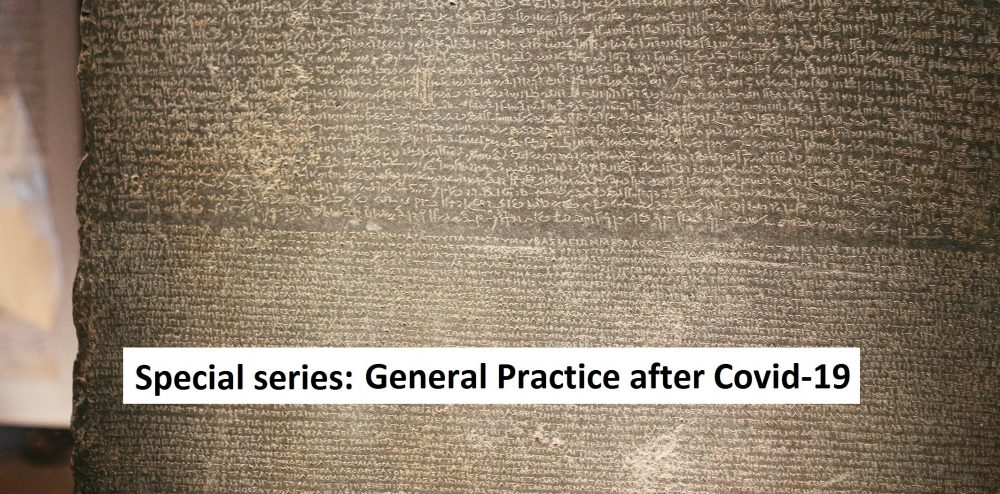 Peter Toon is a retired GP and GP academic. His research area is the philosophy and ethics of healthcare. His writing, both medical and non medical is available via his website – https://sites.google.com/site/peterdtoon/
Peter Toon is a retired GP and GP academic. His research area is the philosophy and ethics of healthcare. His writing, both medical and non medical is available via his website – https://sites.google.com/site/peterdtoon/
My impression is that over the last year general practice has needed all its energy just to keep its head above water. Hardly surprising during the worst pandemic for a century. I say “my impression” because I stopped GP work eight years ago and my only role during the pandemic has been as an educational advisor, so my perspective is that of patient and relative rather than clinician. But now there is perhaps light at the end of the tunnel, even if some way away, we need to step back and review our practices and priorities.
Long ago I suggested that general practice had three components; curing disease and alleviating symptoms using the biomedical model, preventing illness, and a third element which I called the hermeneutic or interpretative function.1 Michael Balint was referring to part of this role when he spoke of GP s helping people “bear what has to be borne”. More recently Reeves has explored this function further as “Interpretive Medicine”.2 It is part of “person centred care”, which also includes ensuring that care is coordinated and takes account of the individual’s situation and values.
In a year when a lot of people got very ill, very quickly, attention has rightly focussed on the biomedical.
In a year when a lot of people got very ill, very quickly, attention has rightly focussed on the biomedical, inevitably sometimes with a “one size fits all” approach. Recently the need for the most extensive vaccination campaign ever has put prevention at the front of our minds. But if healthcare is to flourish as a practice in the sense Alisdair MacIntyre uses the term3 – as an activity which promotes human flourishing and the virtues and produces “internal goods” (goods such as knowledge, skill, joy and love, not subject to a “zero-sum” rule) – then the interpretive function must be central.4 How we understand and make sense of our illnesses affects how well we flourish, whether or not healthcare can offer cure or palliation.
If healthcare is to flourish as an activity which promotes human flourishing ….. then an interpretive function must be central.
All good clinicians are person-centred and help patients understand and deal with their illnesses, but this is easier in general practice, rooted in the community, rather than in emergency departments or other services where contacts are transient and impersonal. Clinicians in general practice can have a more detailed knowledge of their patient’s circumstances and relationships, and know them over a longer period of time than hospitals clinicians, apart perhaps from those who treat chronic diseases like rheumatoid arthritis or chronic renal failure. If general practice clinicians do not help their patients understand and make sense of their illness, perhaps no-one will. You may have noticed that I say “general practice clinicians” rather than general practitioners, because nurses, physiotherapists and health care assistants can do this just as well as GPs. I have seen receptionists doing it too. Personal relationships, empathy and integrity, not qualifications, are central.
It will take a deliberate effort to move general practice on towards a more interpretive, person-centred focus. I say “move on” because a question about the pandemic I find very depressing is “when will things get back to normal?” Of course there are things we used to do that we cannot do now and we hope to do in the future – have dinner with friends, go to the pub, give family and friends a hug. But the idea that we will ever find ourselves back in 2019 is deeply unrealistic. A society cannot go through an experience like the pandemic and emerge unchanged, any more than things were the same in 1920 as in 1913 or in 1946 as in 1938.
General practice …. will have to change to a “new normal”.
- Maximising continuity of care.
- Letting go of things general practice doesn’t need to do.
- Using telecommunication well.
- Making decisions between patients and professionals, not politicians.
Continuity
Even before Covid, patients did not always get the continuity of care which make person centred care and interpretive medicine easier and more effective, despite evidence that it was cost effective in reducing hospital admissions,6 and probably also cost-effective in GP time too, since it takes time for new clinicians to familiarise themselves with the patient’s history. Problems in continuity were fuelled by larger practices, part-time working and access pressures,7 and not helped by targets which prioritised access over continuity.
The rapid move to telemedicine without systems in place to ensure continuity of telecare, combined with health professionals falling sick with Covid or having to self isolate, seems to have made maintaining continuity more difficult during the pandemic. Certainly that is my experience and that of those I know. It is therefore disappointing that promoting continuity of care is not listed as a focus for the Primary Care Institute. However good clinicians are at shared decision making, supporting self management and planning personalised care, they cannot do it well if they have to start from scratch with a new patient in every consultation. This needs good systems as well as individual commitment.
Maintaining continuity …. needs good systems as well as individual commitment.
Giving things up
The core task of general practice is helping those “who are or who believe themselves to be ill”. What could general practice give up to make space to do this well, with appropriate emphasis on interpretative as well as the biomedical aspects? I would argue that despite increasing emphasis on prevention in recent years, this function is mostly dispensable for general practice. Unless you are severely needle phobic it matters little whether a vaccination is given by someone you know or by a stranger, and few are harmed by an “assembly line” approach. This is important because one likely long-term consequence of the pandemic will be an ongoing workload of Covid boosters, perhaps for most of the population.
Similarly many people can and do offer lifestyle advice, take cervical smears and other screening tests as well as or better than GPs or practice nurses, and so long as the practice is kept informed of these interventions does it really matter who does them? Drug treatment to reduce risk factors like hypertension and high cholesterol are the only aspects of prevention perhaps best done in general practice, because of their interaction with other illnesses and treatments.
Telemedicine
An obvious result of Covid has been increased use of online communication. Zoom usage increased thirty times in the first few months of the pandemic. People have got used to doing things online, and are likely to find it convenient to continue to do so even when face to face contact is considered safe. Also after more than a year of social distancing “staying home, protecting the NHS, saving lives”, many are likely to be reluctant to sit in busy waiting rooms sharing germs with coughing elderly bronchitics and febrile children, even if the Covid risk is low.
So surely a long term change for general practice will be more tele-consulting, which in the past healthcare has been slow to accept. The telephone has been around for many decades, but when my practice introduced regular telephone appointments in the 1990s, it was innovative, controversial, and the literature was scanty.8
Even three years ago, when my mother was diagnosed with haemolytic anaemia, hospital reviews by telephone to discuss her blood tests results were only offered when I specifically asked for them because each hospital visit meant two hours travelling and finding a driver. More recently Greenhalgh et al found similar slow uptake and anxieties with video-consultation,9 and Huygens et al with email consultations.10
Although this changed overnight when Covid meant as many consultations as possible should take place at a distance to protect patients and staff, inevitably arrangements for such a rapid change were makeshift. The best medium for a specific purpose was not always available; for example a friend reports being refused video-consultation and offered only telephone or face-to-face for a condition (myasthenia gravis) where being able to see the patient would surely have been useful, and touch less so. Systems to ensure continuity and convenience for patients of tele-consultation were also not in place. This, coupled with the unerring ability of NHS management to make poor software decisions, means a radical overhaul is needed if general practice is to make the best use of tele-consultation.
How can we promote the core interpretive function of general practice in this new more distanced world?
Text-based and telephone consultations can also provide continuity and personal care, but do not always do so. For example a few months ago I had a query about ear wax, so I decided I would use my practice’s text-based online consultation system, expecting to find a simple form to direct my question to the right person. Instead I had to battle through page after page of a protocol which excluded life threatening possibilities irrelevant to my problem and collected lifestyle data – a sort of “DIY 111” questionnaire. It took several tedious minutes to complete and still someone I didn’t know had to phone me with the answer.
I cannot be the only one who has vowed never to use it again. We need tele-consulting systems which support personalised, patient-centred, interpretive medicine, not a call centre approach. Developing systems which are user friendly, give personal care and are safe and efficient will need some hard thinking, involving both clinicians and patients.
Continuing Professional Development has also moved online and much will probably rightly stay there as for many purposes this is very practical. Interpretive medicine can be taught this way (for example one can do Balint Groups online), but this too needs appropriate systems. Successful distance education is not just lectures on Zoom instead of in a lecture theatre – it needs thoughtful educational design and a proper platform. Microsoft Teams, currently the NHS’s preferred platform, is not designed for this purpose and is very unsuitable.
Flourishing healthcare is a collaborative activity between patients and professionals.
Flourishing healthcare is a collaborative activity between patients and professionals, but because Covid has required government action on an unprecedented scale politicians have got used to being involved in the details of healthcare provision, and seem to want to hang on to that control. Whilst acknowledging the “extraordinary dedication, care and skill of the people who work in our communities and our hospitals” the draft White Paper on the NHS also proposes “enhanced powers of direction for the government” over the NHS.12 This is not surprising. It is just another example of the hostility to professional expertise characteristic of populist politics. But politicians are unlikely to prioritise or even to understand the importance of interpretive medicine, continuity of care or patient-centred systems for telemedicine.
General practice with its close and continuing links to other primary care professions and a wide variety of patients is ideally placed to work with them to ensure flourishing, not political values, triumph in post-Covid healthcare. As the thoughtful voice of General Practice, the Royal College should bring people together to this end without delay.
References
- Toon PD (1994) What is Good General Practice? RCGP Occasional Paper no 65 publ RCGP London. https://pubmed.ncbi.nlm.nih.gov/9248307/
- Reeeves J (2010) Interpretive Medicine ;Supporting generalism in a changing primary care world Occas Pap R Coll Gen Pract. ; (88): i-viii, 1-20. https://www.ncbi.nlm.nih.gov/pmc/articles/PMC3259801/
- MacIntyre A (1982) After Virtue publ Duckworth London
- Toon (2014) A Flourishing Practice? Publ RCGP London https://library.oapen.org/handle/20.500.12657/45645
- RCGP (2020)New personalised care training hub will set standards for evidence-based education and aims to reach 75,000 health and care workers by 2024 – Press release https://www.rcgp.org.uk/about-us/news/2020/september/new-personalised-care-training-hub.aspx
- Deeny S et al (2017) Reducing hospital admissions by improving continuity of care in general practice publ Health Foundation London https://www.health.org.uk/publications/reducing-hospital-admissions-by-improving-continuity-of-care-in-general-practice
- Pereira Gray D, Freeman G, Johns C & Roland M (2020) Covid 19: a fork in the road for general practice. BMJ 2020;370:m3709 https://www.bmj.com/content/370/bmj.m3709
- Toon PD (2002) Using Telephones in Primary Care (Editorial) BMJ. 25;324(7348):1230-1. https://www.bmj.com/content/324/7348/1230.full
- Greenhalgh P et al (2014) Virtual online consultations: advantages and limitations (VOCAL) study BMJ Open https://bmjopen.bmj.com/content/6/1/e009388
- Huygen MWJ et al (2018) Understanding the use of email consultation in primary care using a retrospective observational study with data of Dutch electronic health records https://bmjopen.bmj.com/content/8/1/e019233
- Bower E (2019) LMCs vote to remove home visits from GP contract GP (newspaper) https://www.gponline.com/lmcs-vote-remove-home-visits-gp-contract/article/1666629
- Integration and Innovation: working together to improve health and social care for all [working title]. The Department of Health and Social Care’s legislative proposals for a Health and Care Bill. TBC February 2021 (leaked draft) http://www.healthpolicyinsight.com/?q=node%2F1699
Featured photo by Matteo Vistocco on Unsplash






